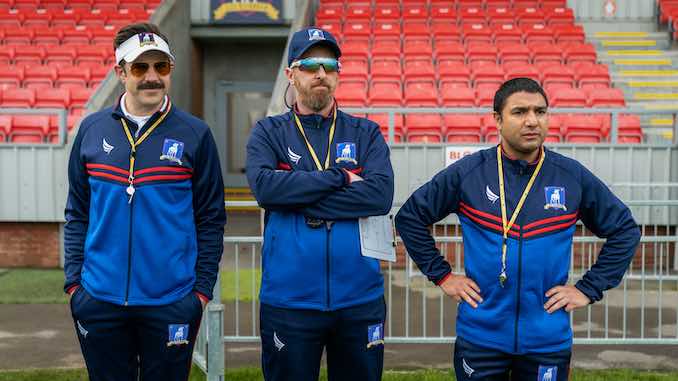After a Shaky Start, Ted Lasso Season 2 Quickly Finds the Goal
Photo Courtesy of Apple TV+
The success of Apple TV+’s Ted Lasso, with its emphasis on kindness, positivity, and respect, probably shouldn’t have been a surprise. A comedy about an American football coach (Jason Sudeikis) who takes a job as the manager of a struggling English Premier League team was the perfect escape from the global pandemic that had forced us inside, fostered uncertainty, and fed our collective anxiety. But it also slipped into the TV space that had previously been occupied by heartwarming shows like Schitt’s Creek and Parks and Recreation, two comedies that similarly dealt in overwhelming kindness and left lasting impressions on viewers who’d grown weary of the darkness of the antihero age, or who needed a break from everyday life. So you could say it was a perfect storm, that Ted Lasso succeeded because it had the good fortune of debuting at the right time—and that is obviously part of it. But the truth is the show was also just that good, and the endless enthusiasm of the its eponymous coach was so infectious it was impossible to watch the series and not feel the same joy he was experiencing in the face of adversity.
One has to wonder, then, whether the comedy will be able to reach the same highs in Season 2, which premieres July 23 on Apple TV+ and will roll out weekly. The good news is, the new episodes are similarly strong and exceptionally enjoyable. But there is a shocking development that exposes a serious lack of judgment to kick things off, and unfortunately, Apple TV+’s list of topics that are off limits covers essentially everything of note that happens in the new season, which makes it difficult to talk about why the premiere is such a disappointment in relation to the rest.
However, the lengthy list of embargoed information that accompanies Season 2 does tell us a few things. First, Apple likely knows that the questionable storytelling decision that opens the season goes too far, feels out of sync with the rest of the show, and thus won’t be well received by critics or fans. It is misguided at best and needlessly cruel at worst, which makes it an odd choice for a series that is the TV equivalent of sunshine and rainbows. But Apple also doesn’t want critics to talk about the good aspects of Season 2 either. This bizarre muzzling of critics could be seen as a sign the tech company still doesn’t quite understand the media space in which it’s operating, nor does it know what to do with its one and only hit series. Because Ted Lasso is definitely a hit series, and so far it is the only Apple TV+ show to break through to the masses. Sure, The Morning Show was talked about plenty—and it even won an Emmy for supporting drama actor—but it wasn’t as good or as consistent as Ted Lasso’s first season, nor did it continue to grow by word of mouth; it didn’t capture the attention of TV viewers the way Ted Lasso did. Apple is still trying to figure out how this business works, and it shows.
Luckily, after a less-than-successful start to the season, Ted Lasso quickly regains its footing, and the writers reveal they haven’t completely forgotten how to make good TV. If Season 1 was a fish-out-of-water story about a man who succeeds through kindness and positivity and baking really great biscuits, then Season 2 is all about the health and success of the team and expanding the narrative beyond Ted’s immediate influence on those around him.
Without saying too much—because, again, Apple took away all the wrong lessons from Mad Men’s restrictive press notes from AMC—the show introduces two storylines that speak to the current sports landscape. The first, which is the better of the two, involves the mental health of AFC Richmond’s players and staff. This is an important topic the show is wise to tackle, especially in 2021. Elite athletes like Kevin Love, Michael Phelps, Naomi Osaka, and Simone Biles have all spoken about the necessity of prioritizing the mental well-being of athletes, people whose jobs and sometimes self-worth can be tied to their physical health and their ability to win and perform. They face pressure every single time they step out onto the court or dive into the pool, and as more and more athletes have opened up over the years, it has brought awareness to mental health and helped to destigmatize talking about it. So while Ted seems to be the only person in Richmond’s entire operation who is opposed to the idea of therapy, Ted Lasso was right to take on this particular subject.